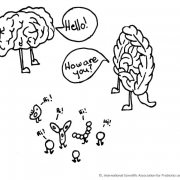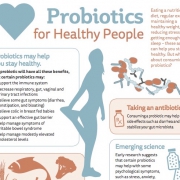The Times They Are A-Changin’ With Probiotics
December 15, 2017. By Prof. Daniel Merenstein, MD, Department of Family Medicine, Georgetown University Medical Center, Washington DC.
I had a surprising encounter a few weeks ago in the clinic. I was caught off guard, had to take a step back and think about what happened. I recommended to my patient that she take a probiotic with the antibiotic I was prescribing. She said to me, “What is a probiotic?” My response was, “A probiotic,” as if it didn’t require any further explanation. It was nearly incomprehensible to me that she didn’t know what a probiotic was and maybe she just didn’t hear me or just didn’t understand me (I tend to speak too fast). But no, she just didn’t know what one was. I then realized how unusual this encounter was.
Something has been a-changing. It hasn’t been a quick process and I am not sure when it changed, but it did. Even just a few years ago when I recommended supplementing a course of antibiotics with a probiotic, people were generally receptive and had a vague idea about probiotics. However we generally had to talk about what probiotics were and how to use them. Fast forward to today and it appears to me that 95% of people respond, “I already take one.” Much more common than hearing “What’s a probiotic?” is to hear, “Of course, you always have to take a probiotic when taking an antibiotic.”
I am currently recruiting for my 8th probiotic clinical trial (PLAY ON). My team has recruited over 1,400 participants for previous studies. We have a system and a great team, but we are having the most difficult time recruiting for this study. I have thought a lot about why and I think it comes down to the times they are a-changin’. When we started on this research path 12 years ago, our research team and the subjects we recruited were excited about probiotics and their potential. But today the public doesn’t see the potential of probiotics; they know probiotics impact the gastrointestinal tract and should be used when taking antibiotics. Therein lies our challenge: to be in our study a subject has to be willing to take the chance of being in the placebo group. That makes little sense to a public that already knows to take a probiotic when on antibiotics.
My first two NIH studies were funded by the National Center for Complementary and Integrative Health, while my current study is funded by the National Institute of Child Health and Human Development. The shift has occurred from complementary, to mainstream. One need no longer attend a microbiome or probiotic conference to hear talks on probiotics; nearly all clinical conferences will now have probiotic talks. I am confident my team will adjust to these changing times but I think more important is how researchers and clinicians adjust. Probiotics are not alternative options anymore, the evidence base is robust and some indications well-studied. The discussions need to shift from, “You should have probiotics on formulary” to specific recommendations of which probiotics should be used for what indications. Similarly when discussing other disease states in the gut (e.g. necrotizing enterocolitis, infantile colic, and irritable bowel syndrome), it is time to take the next step and discuss specific recommendations. I am sure I will see another patient who has never heard of probiotics, but I’m willing to bet that doesn’t happen for many months. More likely, I expect I will be discussing the efficacy of the products my patients are already taking. That is an important change that docs need to think about.
Come gather ’round people
Wherever you roam
And admit that the waters
Around you have grown
And accept it that soon
You’ll be drenched to the bone.
If your time to you
Is worth savin’
Then you better start swimmin’
Or you’ll sink like a stone
For the times they are a-changin’.
Bob Dylan, Nobel Laureate
The Times They Are A-Changin’
Columbia Records, 1964















